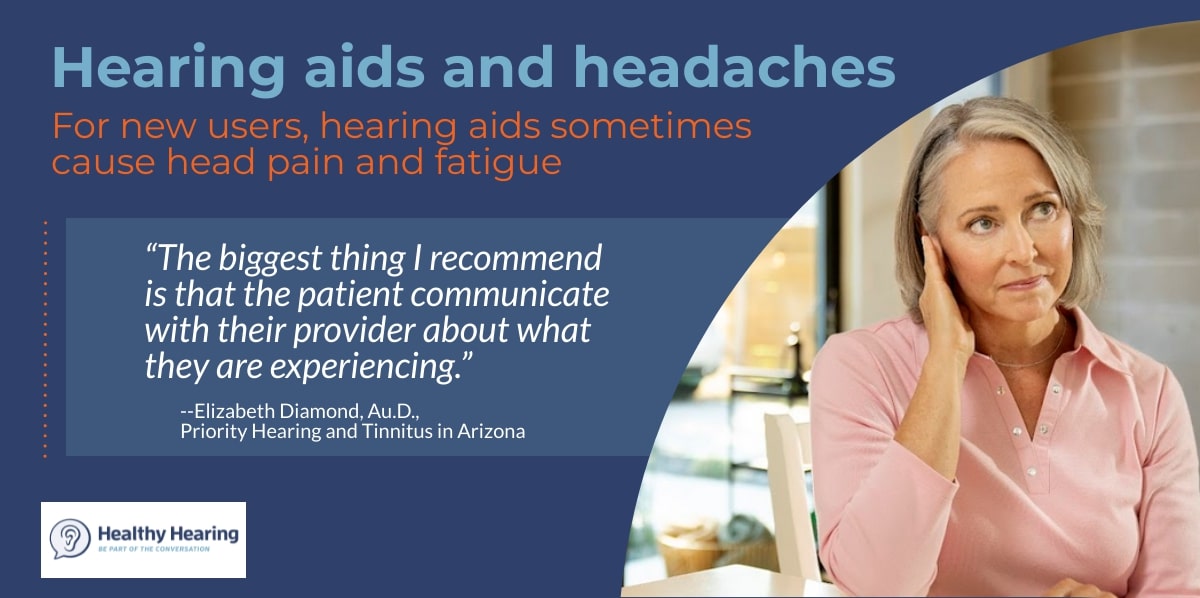If you think your hearing aids are causing your headache, you might be right—especially if you have a new pair.
But instead of storing them away in the nightstand and forgetting about them, hearing healthcare professionals encourage you to talk to your provider to troubleshoot solutions.
“Hearing aids can definitely cause headaches, but I also say to that, so can a lot of other things,” Elizabeth Diamond, Au.D., of Priority Hearing and Tinnitus in Arizona, says. “The biggest thing I recommend is that the patient communicate with their provider about what they are experiencing.”
Hearing aids work with your ears to amplify sound, then send it to the brain for interpretation. If you haven’t been hearing well for a while, the influx of noise may be uncomfortable at first, causing fatigue that may result in head pain, not unlike how you might feel after having to listen to a long speech for many hours. (It's worth noting that hearing loss also can cause listening fatigue, due to how hard your brain is working to hear.)

Hearing sounds again can be overwhelming at first
Dr. Diamond said the most common side effect she hears from her patients is that they notice too many little sounds around them, like the air conditioner kicking on or birds chirping. This side effect typically dissipates over time once the brain remembers how to filter sound.
“Hearing those sounds again can be very overwhelming,” she acknowledges. “People with normal hearing hear all of these things but our brain is effective at knowing which things are important. When you lose hearing, the brain forgets and is out of practice in trying to eliminate erroneous signals.”
Why hearing aids may give you headache
Beyond that, the reason for headaches is usually related to one of two things, says Dr. Diamond:
- The devices may be delivering too much sound or you’re receiving sound at a volume that’s too high.
- If the hearing aids are not fitting properly, the resulting discomfort can manifest as a headache.
In either case, it's vital that you communicate with your hearing care provider about your experience.
Headaches from hearing aids are almost always treatable
Depending on the hearing aids you’ve purchased, both problems can often be fixed with a few adjustments.
“Hearing aids these days are so amazingly technologically advanced that we can make adjustments without sacrificing quality,” Dr. Diamond says. “We have so much control these days, depending on the hearing aids you purchase, many concerns are a lot more addressable now than they ever were in the past.”
More: 7 tips for getting used to your new hearing aids
Reasonable expectations
But do have realistic expectations. In other words, don’t expect lower tier hearing aids to function in the same manner as premium models, or to be able to hear as well as you did when you were younger.
Dr. Diamond asks her patients to write a descriptive list of what they like about their hearing aid experience —as well as things they don’t like—so she can determine whether to provide counseling about expectations or make an adjustment.
“The experience varies so much from person to person,” she says. “Articulating what you like and what you don’t like can help us fine tune.”
New hearing aid users may experience other side effects
In addition to headaches and fatigue, new hearing aid users may also experience:
- Dizziness
- Tinnitus (ringing in the ears. It is also a common symptom of hearing loss.)
- Itchiness and skin irritations
- Discomfort
- Feedback
If you are experiencing any of these, talk to your provider.
More: New hearing aids? FAQs for (nearly) all you need to know
A few more words of advice
To maximize success on your journey back to better hearing, Dr. Diamond recommends finding a provider you like and trust who is receptive to your feedback and complaints. And before you buy, be mindful of the warranty and return policy. They vary from provider to provider.
“There’s a lot that can be done, but it often it has a timeframe. It’s very important to know what’s an appropriate next step.”
The above is the interpretation of Can Hearing Aids Cause Headaches? Causes and Fixes provided by Chinese hearing aid supplier Shenrui Medical. Link https://www.srmcm.com/Blog/Can_Hearing_Aids_Cause_Headaches_Causes_and_Fixes.html of this article is welcome to share and forward. For more hearing aid related information, please visit Blog or take a look at our Hearing aids products















